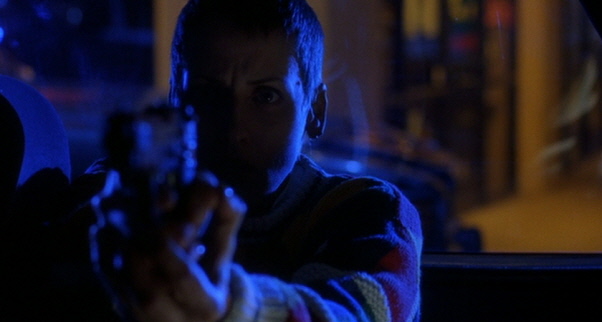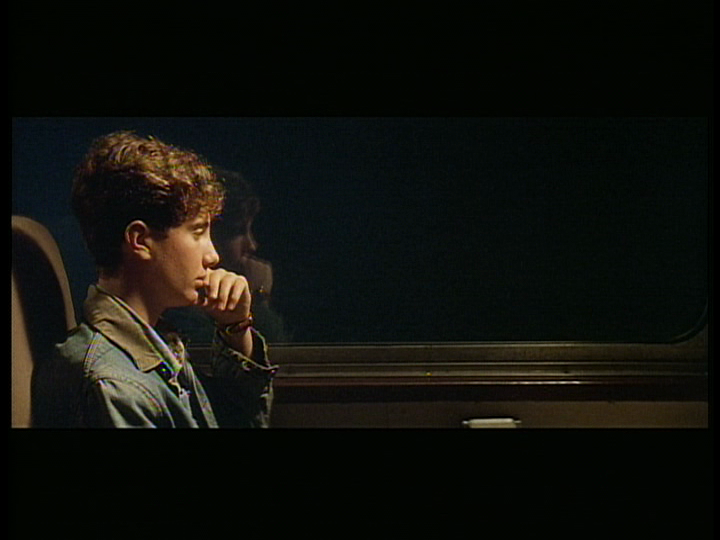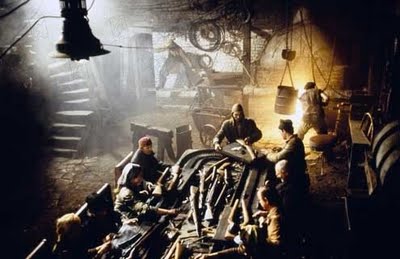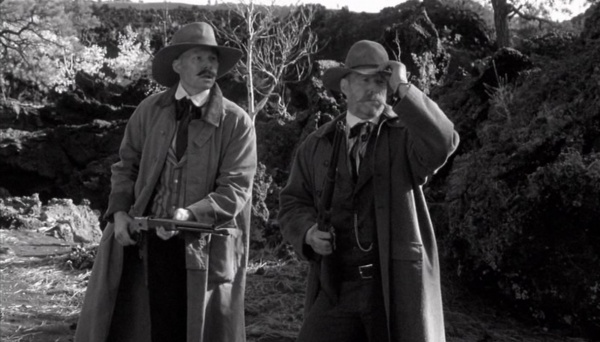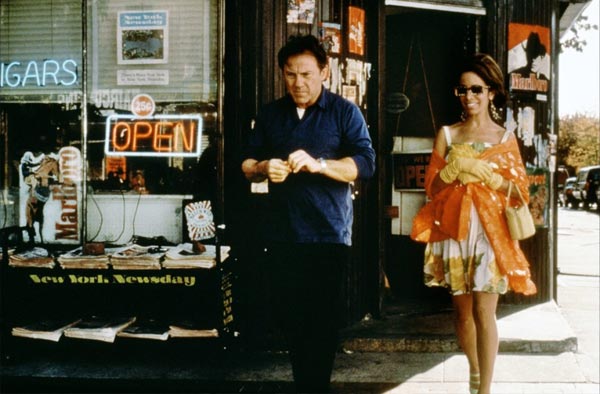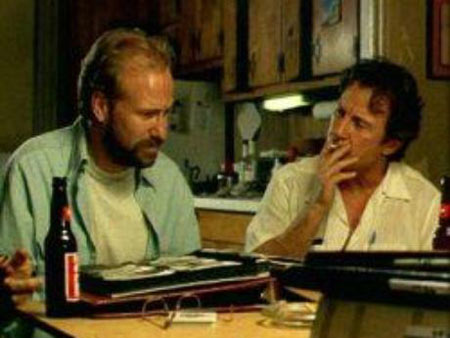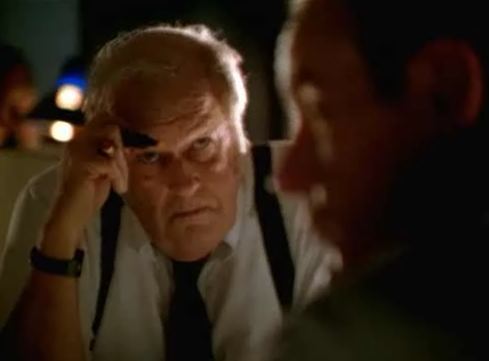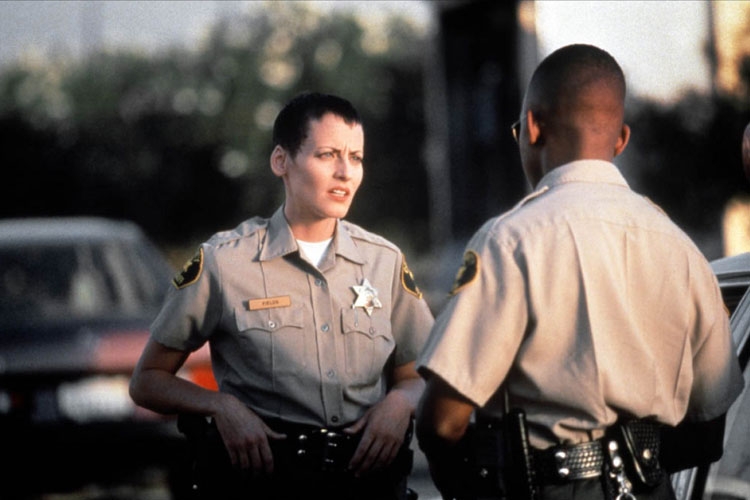From the Chicago Reader (June 16, 1995). — J.R.
The Glass Shield
Rating *** A must see
Directed and written by Charles Burnett
With Michael Boatman, Lori Petty, Ice Cube, Elliott Gould, Richard Anderson, Don Harvey, Michael Ironside, Michael Gregory, Bernie Casey, and M. Emmet Walsh.
Smoke
Rating * Has redeeming facet
Directed by Wayne Wang
Written by Paul Auster
With William Hurt, Harvey Keitel, Stockard Channing, Harold Perrineau, Giancarlo Esposito, Ashley Judd, and Forest Whitaker.
My dozen favorite films at Cannes this year? Terence Davies’s ecstatic wide-screen The Neon Bible, set in a perfectly imagined Georgia of the early 40s, with Gena Rowlands; Emir Kusturica’s Yugoslav black-comedy epic Underground; Hou Hsiao-hsien’s beautiful if difficult Good Men, Good Women; Jim Jarmusch’s transgressive western Dead Man; Jafar Panahi’s The White Balloon, an Iranian urban comedy about children that unfolds in real time; Zhang Yimou’s Shanghai Triad, a cross between Sternberg’s The Devil Is a Woman — with Gong Li taking the place of Marlene Dietrich — and Billy Bathgate; and Manoel de Oliveira’s The Convent (Ruizian metaphysics and theology with John Malkovich and Catherine Deneuve). Then there were such pleasures on the market as Gianni Amelio’s Lamerica, a mordant treatment of the collapse of communism in Albania; lively low-budget musicals by Jacques Rivette and Joseph P. Vasquez; and a memorable period extravaganza by Cheik Oumar Sissoko from Burkina Faso called Guimba. My least favorite festival movie was Things to Do in Denver When You’re Dead — the latest stupid, hollow Tarantino imitation — whose wit ends with its title. The only one of the bunch you’re likely to see soon, of course, is the last. If you want to know why, ask Harvey and Bob.
The fact is, my opinions and those of thousands of other critics, the festival programmers, and the jury count for less than the opinions of Harvey and Bob Weinstein, head honchos of Miramax, the production company and distributor that currently has something resembling a monopoly on the art-movie market. If my sources are accurate, Miramax is tickled pink about Things to Do in Denver, which it produced; has no plans to distribute the Davies film (which it coproduced) in the United States; has picked up the Jarmusch; will probably distribute a shorter version of the Kusturica; and might handle one or two other items listed above. Other pets of theirs have included The Crying Game, The Piano, Pulp Fiction, Queen Margot (which they extensively and expensively recut), Bullets Over Broadway, Ready to Wear, Kieslowski’s trilogy, Priest, The Englishman Who Went up a Hill but Came Down a Mountain, the forthcoming Kids, and both The Glass Shield and Smoke — two nearly antithetical takes on contemporary black-white relations, set respectively in Los Angeles and Brooklyn.
What Harvey and Bob think will determine not only whether you’ll see the film and whether and how it will be recut or reshot but also how it will be promoted and discussed by the media — including most critics. For The Englishman Who Went up a Hill Harvey and Bob threw a big party on the Majestic beach the last night of Cannes, right next to a reconstruction of said hill/mountain (perfect for photo ops with Hugh Grant) and blasted the score from several speakers loudly enough to discourage conversation. Accurately gauging the puritanical hysteria of this country, they promoted Kids, a so-so AIDS fable about heartless, unsafe teen sex, by showing it only once, at midnight, at the Sundance festival in January, setting up an aura of mystery and money that lasted for four breathless months. Sure enough, many who saw it at Sundance wrote excitedly (and inaccurately) about “kiddie porn” and searing artistic vision, creating expectations that couldn’t possibly be met when the film showed in Cannes, underwhelming practically everyone but the hopeful hacks eager to gull the American public all over again. (Keep watching your TV sets, and don’t forget to ask Bob Dole what he thinks about it, too. If Dole said he saw an elephant fly, you can bet Time would offer a cover story on whether elephants in fact sprout wings.)
You can glean the sort of commercial scheming Miramax does from its presentation of Priest: after cutting a lot of the gay sex to secure an R rating, they gave the film its national release on Good Friday. The prominent Catholics who then denounced the picture — many of whom couldn’t distinguish between Miramax’s efforts and those of the filmmakers — played right into their hands. (Despite such noble efforts the film performed disappointingly, as have The Englishman Who Went up a Hill and Queen Margot, demonstrating that the Weinstein brothers aren’t always the experts people say they are.)
To give you some idea of what Harvey and Bob think of Charles Burnett’s The Glass Shield, they blocked the film’s release for a full year, forced Burnett to write and direct a less blunt and despairing ending after some test-marketing, refused to let the original version be shown at a Burnett retrospective in New York, and finally, after sending Burnett on a few interviews, shoved the picture out earlier this month* Thanks to Miramax’s handling, this art movie’s local bookings have been exclusively at drive-ins and theaters like Ford City and Chestnut Station, until it turned up this week at the Three Penny. For Smoke, on the other hand, they flew journalists into New York to chat with screenwriter Paul Auster, director Wayne Wang, and actor William Hurt and dispensed numerous other courtesies; if you compare the press books for The Glass Shield and Smoke, the differences in care are palpable (the one for The Glass Shield consistently misspells Elliott Gould’s name, for instance).
Of course, some Miramax pictures get treated even worse than The Glass Shield. I shudder to imagine what Harvey and Bob must think of Abbas Kiarostami’s Through the Olive Trees — the first Iranian feature ever released in this country, and one of my favorite films at Cannes last year. A few months ago Miramax gave it only minimal, last-minute press screenings in New York and Los Angeles and minuscule ads that virtually guaranteed minuscule business, then withdrew it from distribution, which means that Chicago won’t see it at all. In other words, it’s Harvey and Bob — not Roger and Gene, say, or some New York Times reviewer — who determine what most of this country will think (or not think) about Iranian cinema, just as it’s Harvey and Bob who’ve defined the genre of The Glass Shield as “Hollywood cop movie” for most critics. (Not all of them, however: check out Terrence Rafferty’s perceptive review in the June 12 issue of the New Yorker, which ranks the film alongside Kurosawa’s The Bad Sleep Well and Satyajit Ray’s The Middleman “as an anatomy of moral corruption.”)
People who regard movies as an occasional diversion and nothing else find it perfectly OK for people like Harvey and Bob to serve as their cultural arbiters and commissars, determining when, how, and even if they will be introduced to the masters of Asian cinema and dictating, for example, the emotional tone of the last scene in The Glass Shield on the basis of responses from teenagers at a Bronx preview. After all, the willing delegation of critical responsibility to a couple of brassy salesmen is the logical outcome when our culture considers the weekly grosses much more interesting and worthy of close analysis than anything else about a film. The fault, dear Brutus, is not in Miramax, but in ourselves, that we are their underlings.
It’s quite possible that I’d like Smoke a little more if Harvey and Bob and their cheering section liked it a little less. True, its central story is a self-congratulatory lie about American race relations — a macho security blanket specifically designed for those who can’t bear the art and lucidity of something more complex and threatening like The Glass Shield. But many of the performances, especially those by Harvey Keitel and Forest Whitaker, are beautifully inflected, and Paul Auster’s script, an intricate set of interlocking stories and anecdotes, is clever and graceful. The film created pandemonium at its press conference in Berlin last February, where the international press seemed filled with a kind of blood lust for the next Pulp Fiction. (At big film festivals these days nobody seems to care about good films per se, only about potential blockbusters.) I don’t expect Smoke to become the monster success Pulp Fiction was — it doesn’t have enough sex or violence or visual style or star power even to try. But there’s no question that it speaks to the ideological needs of guilty white liberals; it’s small wonder that the movie’s source was a Christmas story Auster wrote for the op-ed page of the New York Times.
It’s no surprise, then, that Smoke is opening in an exclusive run at Pipers Alley rather than at drive-ins, Ford City, or Chestnut Station, venues typically attended by a good many black people. Something tells me that black teenagers aren’t going to be thrilled about a movie telling them how fortunate they are to have great white fathers like Hurt and Keitel watching out for them and their interests. For the same reason, I seriously doubt that Smoke was test-marketed in ghetto theaters, despite the presence of a few black characters. Unlike The Glass Shield, it’s been treated as an art film from the outset, not as a failed Hollywood or TV movie. (Of course, Hoop Dreams has proved that an art movie can also play successfully at ghetto theaters, but this breakthrough required the sort of special handling Miramax was too busy to bother with in Burnett’s case.)
Divided into five chapters — each named after a different character, as in a novel — Smoke gives us a novelist named Paul (Hurt), grieving after the accidental street death of his pregnant wife, and a black teenager named Rashid (Harold Perrineau) who lies compulsively and tracks down his long-lost father (Whitaker) but doesn’t reveal his own identity. Paul takes him in for a spell; the second father figure is Auggie (Keitel), a cigar store manager in the neighborhood who’s a friend of Paul and becomes Rashid’s employer. Midway through the film Auggie’s former girlfriend Ruby (Stockard Channing) turns up asking for help for her daughter Felicity (Ashley Judd), who’s pregnant and addicted to crack, claiming that he’s her father. Other key elements in this narrative roundelay are the daily photographs Auggie has been taking in front of his store for the past 14 years and a paper bag containing $5,000 Rashid stole from some other thieves.
Auster is a faux Beckett novelist for the mainstream with mystical underpinnings whose prose is lean and musical, but he took a lamentable turn in his seventh novel, Leviathan, by broaching 60s radical politics from a safe, voyeuristic distance — which meant in effect not exploring 60s politics at all. He started writing Smoke immediately after Leviathan, and in a way the two projects have identical ideological agendas: to tell the white middle class exactly what it wants to hear about itself in relation to the unmet challenges of the 60s. In keeping with this agenda, everything Smoke has to say about crack addicts, black teenagers, errant black fathers, and black toughs is some form of warmed-over Hollywood cliche; but that’s OK, folks, because this is an upscale art movie for thinking people, not Hollywood fodder for the masses. What it does have is an idealized view of white tolerance and philanthropy and the kind of philosophical irony about social problems that makes one feel (as only the op-ed page of the Times can) that all’s right with the world as long as there are a few urbane white people to take care of business and provide pearls of wisdom for everybody else. Director Wang serves all this up with taste, tact, and intelligence — which might be more than it deserves — mainly restricting his sense of style to an increasing use of close-ups over the course of the film.
Maybe it’s the failure of The Glass Shield to offer any trace of such smug reassurance that turned Harvey and Bob against it: Burnett’s world is bereft of role models white or black. Heroes of both races and villains (mostly white) can still be found, but they’re not the sort of heroes easily identified with. The main ones here are both Los Angeles cops: Johnson (Michael Boatman), a black rookie in an otherwise all-white precinct, and Fields (Lori Petty), a Jewish woman who’s the precinct’s only female. He’s ambitious enough to think that one day the station house will be named after him and she’s smart enough to know that it never will be, but there’s nothing glamorous about either of them, and the only thing that binds them — politically, not romantically — is their mutual exclusion from the force. Furthermore, the Hollywood narrative streamlining that would normally help us identify with them is purposefully subverted virtually from the beginning.
Johnson’s first act as a cop is to stop a speeding car, but he drops all charges when the black woman driver flirts with him. Appalled, his white partner chews him out, then stops the same woman again and gives her a ticket. Even though we’re made to feel that the white partner is right and Johnson is wrong, the way Johnson is berated is disquieting, suggesting racist attitudes. Immediately we’re placed in a quandary that’s unthinkable in most Hollywood cop movies — a situation where we’re less than sure about who’s “good” and who’s “bad.” And rather than relax this tension, Burnett reproduces it again and again, in varying degrees and forms, throughout the picture, even after Johnson perjures himself to protect a white officer who may have helped frame an innocent black man. Johnson’s burning desire to be accepted by his white colleagues winds up affecting his judgment, and we can’t help but be swept up in some of his uncertainties. Based on the true story of John Eddie Johnson, the first black officer in an all-white sheriff’s office in Los Angeles County, The Glass Shield is essentially concerned with the kind of everyday moral dilemmas everyone encounters; as Rafferty cogently puts it, “The truth that informs all the action…is simple and profoundly political: you can’t know yourself until you know what you’re a part of.”
In short, what’s confusing about The Glass Shield, Burnett’s fourth feature (after Killer of Sheep, My Brother’s Wedding, and To Sleep With Anger), is that it’s a police procedural that refuses to play most of the Hollywood games associated with police procedurals: there’s no profanity, little violence, not much humor, and just a smattering of action. The film is loaded with plot, however; if the movie has a serious flaw, it’s that a plethora of incidents and procedures sometimes overwhelms the only story that really matters — Johnson’s gradual horrified discovery of the way that American power and justice work in a Los Angeles police station, and what this process has done to him and to others. I’ve seen the film three times now — twice with its original bleak ending, without all the gratuitous closing titles about what happened to the characters — and each time the plot has seemed a bit overloaded just before moving into the powerful, lucid final act.
Yet The Glass Shield has a specifically cinematic vision and visual poetry utterly foreign to the strictly literary virtues of Smoke; Burnett’s movie hurtles along with a distinct narrative style all its own. A beautiful succession of comic-book panels behind the opening credits and the following slow-motion sequence in which police academy graduates toss their batons into the air establish a dreamlike drift, illustrating Johnson’s fantasies about being a cop. Everything else that follows serves to undermine this drift, but Burnett remains a filmmaker who avoids simple or didactic visual effects. The noirish figures in silhouette that dominate the film’s later sections may suggest nightmares, but they’re realistic rather than expressionistic nightmares, the kind we all live in.
Burnett’s sense of character is similarly fresh and unpredictable and ambiguous, and his quirky direction of actors keeps all the mysteries of their characters alive and swarming — not only in Boatman’s expressive performance as Johnson but also in the pivotal smaller roles played by Ice Cube, Don Harvey, and Elliott Gould. Some critics have apparently expected The Glass Shield to adopt the convention of Hollywood and TV movies that characters must be instantly readable. But part of what’s subversive about Burnett is that, despite the profusion of characters here, they’re almost never clear-cut. For all the old-boy villainy exuded by such classic Hollywood character actors as Richard Anderson and M. Emmet Walsh as senior officers — Burnett seems to relish capturing their rotting corruption in rogues’ gallery close-ups under Rembrandt-like lighting — one never feels he’s content to stick with these simplifications: his eccentric, inquiring sensibility keeps getting in the way of the stereotypes, complicating our responses.
And what he does with Lori Petty — both in defining her sexuality and in ruthlessly excluding everything about her that’s unrelated to her professional life — is so interesting and so contrary to standard Hollywood practice that this underrated actress is able to grab whole sections of the movie for herself. But given Harvey and Bob’s promotion of this picture — and their very different way of handling Smoke, all of whose female characters are pathetically lame, cliched, and/or marginalized — I suspect they wouldn’t agree. And in the final analysis it’s their opinion that counts, not yours or mine or Burnett’s.
*Correction (December 2016): As Burnett has recently clarified in an interview on the BFI’s Blu-Ray edition of The Glass Shield (scheduled for release later this month), this is not what happened. The less harsh ending written and shot by Burnett was done according to his own wishes (I find the original ending more powerful, but can certainly understand his reasons for wanting to tone it down), and whatever his differences with the Weinstein brothers, he has further suggested that the final decisions made on the film were his own.

